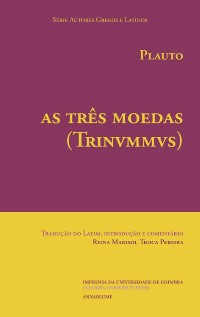Please use this identifier to cite or link to this item:
https://hdl.handle.net/10316.2/34862| Title: | As três moedas (Trinummus) | Other Titles: | The three pieces of money | Authors: | Plauto Pereira, Reina Marisol Troca, trad.; coment. |
Keywords: | Friendship;fidelity;appearance;truth;adolescence;treasure;Amizade;fidelidade;aparência;verdade;adolescência;tesouro | Issue Date: | 2014 | Publisher: | Imprensa da Universidade de Coimbra Annablume Editora |
Journal: | Classica Digitalia. Série Autores Gregos e Latinos | Abstract: | Trinummus is another fabula palliata by Plautus. Enriched by the art of the Latin author, the result was too tedious and very elitist, compared to what usually characterized the Plautine comic. Through stock characters of fixed social types (e.g. the old, the Young, the slaves), several cultural themes are analyzed, such as friendship, morality, loyalty, money. Thus, the senex Charmides, whose assets were in danger because of the conduct of his son, Lesbonicus, leaves Athens. Meanwhile, his young son and daughter were trusted to his friend Callicles, as well as his house. Secretly, Callicles told Charmides about the treasure buried in his home. However, Charmides was in a dilemma, between keeping the secret of his friend and avoiding the dissolute spirit of Lesbonicus. Using his father’s journey to his own profit, the youngster put the house for sale. Therefore, Callicles felt the moral obligation of purchasing it. Lisiteles involuntarily made the situation worse, because of his intention to marry Lesbonicus’ sister. The proposal required a dowry, which constituted a problem to Lesbonicus and to Callicles. This senior, wrongly judged both socially (cf. Megaronides), and privately (cf. Charmides, who had returned from his trip), was finally thanked and praised, when all the facts were acknowledged. Trinummus apresenta-se como mais uma fabula palliata de Plauto. Enriquecida pela arte do autor latino, o resultado obtido revelou-se demasiado entediante, elevado e elitista, face ao que habitualmente caracterizava o cómico plautino. Mediante personagens-tipo de classes sociais recurrentes (e.g. velhos, jovens, escravos), abordam-se temas de relevo, centrados, sobretudo, na amizade, moralidade, fidelidade. Assim, o senex Cármides, cujos bens perigavam, devido ao seu filho, Lesbonico, deixa Atenas, para remediar a situação. Deixa a sua joven prole (filho e filha) ao cuidado do seu amigo Cálicles, assim como a sua casa, que, conforme lhe confia, em segredo, continha um tesouro enterrado. Porém, encurralado entre o segredo do amigo e o espírito dissoluto de Lesbonico, que aproveitara a viagem do pai para obter lucros, colocando a casa à venda, Cálicles compra a habitação. Por seu turno, o joven Lisíteles, involuntariamente, viria agravar o caso, ao pretender desposar a irmã de Lesbonico. Gera-se a necessidade de providenciar um dote, imperativo em que se ocupa Lesbonico e, de novo, o protector Cálicles. De início alvo de crítica social, na pessoa de Megarónides, e, em termos particulares, de Cármides, entretanto regressado, as suas atitudes são, por fim, louvadas, quando esclarecido o seu propósito. |
URI: | https://hdl.handle.net/10316.2/34862 | ISBN: | 978-989-26-0898-3 (PDF) | DOI: | 10.14195/978-989-26-0898-3 | Rights: | open access |
| Appears in Collections: | Pombalina |
Files in This Item:
| File | Description | Size | Format | |
|---|---|---|---|---|
| as_tr_s_moedas_trinummus.pdf | 1.08 MB | Adobe PDF |  |
Items in DSpace are protected by copyright, with all rights reserved, unless otherwise indicated.
